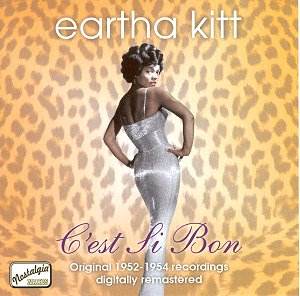 CD Reviews
CD Reviews MusicWeb
Webmaster: Len Mullenger
Len@musicweb.uk.net
[Jazz index][Purchase CDs][ Film MusicWeb][Classical MusicWeb][Gerard Hoffnung][MusicWeb Site Map]

Eartha Kitt – C’est si bon
Original 1952-54 recordings digitally remastered
![]() Recorded 1952-54
Recorded 1952-54
NAXOS NOSTALGIA 8.120800 [63.00]
Crotchet Budget price
C’est si bon
Uska Dara – A Turkish Tale
Bal Petit Bal
Monotonous
I Want To Be Evil
Angelitos Negros
Avril au Portugal
Lilac Wine
African Lullaby
Mountain High, Valley Low
Annie Doesn’t Live Here Anymore
Santa Baby
My Heart Belongs To Daddy
Let’s Do It
Somebody Bad Stole De Wedding Bell
Mink Shmink
Tea in Chicago
My Daddy is a Dandy
This Year’s Santa Baby
Under The Bridges of Paris
Eartha Kitt with orchestras conducted by Henri René, Anton Coppola, Hugo Winterhalter and Abba Bogin
The Naxos Nostalgia team has got around to Eartha Kitt’s celebrated early recordings of 1952-54, the years of her New York breakthrough. Her Cabaret and New Faces successes lead to a series of RCA singles, of which we have a good number here, many of them accompanied by the chorus and orchestra led by Henri René. She traded on her sultry delivery and an affinity for languages partly nurtured by her time in Paris – all leavened with an undertow of mockery that still adds a certain frisson when listening to her delivery (and not just in Santa Baby). The tracks have all been digitally remastered and they sound crisp and balanced even if the fashion of the time was to put the singer under the mike and the band in the corridor.
These early sides show her obvious affinity with Parisian song and it’s inevitably Piaf who looms largest as a direct influence; the hauteur is there but it’s more a question of the vibrato, though she doesn’t possess Piaf’s intensity or quasi-operatic power. In addition to French, she tries out Spanish, Turkish, some Swahili and a touch of New York Yiddish – disappointingly no Portuguese – though overdubbing allows plenty of room for linguistic manoeuvre.
I’m sure that she’s not the only singer to be thought of as a femme fatale but she’s one the few to be able to get away with Arthur Siegel and June Carroll’s outrageous rhyming of femme fatale with Taj Mahal in Monotonous – in fairness the list of celebrities with whom she supposedly dallied in the song makes up for it. The arrangements for the most part in all these songs are functional rather than creative. Under The Bridges of Paris sports a very half-hearted accordion and the more quixotic numbers tend to plough the same generic furrow – one wonders what she could have done with a Robert Farnon or a Nelson Riddle to stretch her.
Still, these twenty sides offer a good slice of Kitt in her earliest days on record.
Jonathan Woolf